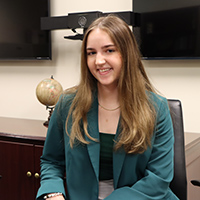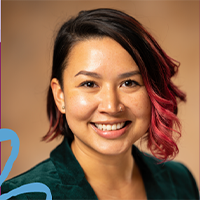by Chris Hilburn-Trenkle
Ally Waters was not expecting that her graduate student research proposal would be chosen.
When she received the news in early April, while driving to meet a friend for a weekend hiking trip in Virginia, she was excited as well as surprised, she admitted.
The first-year doctoral student at the University of North Carolina at Chapel Hill School of Social Work was recently awarded the Graduate Certificate in Participatory Research 2024 Seed Grant Award. Her proposal was titled, “Using Participatory Research Methods to Identify Assets and Opportunities for Diversion and Reentry Services in Rural North Carolina.”
The award is given annually to proposals that strengthen research activity for building an action-oriented learning community that supplies training and resources for carrying out research in collaboration with communities.
“I’m extremely appreciative,” Waters said. “I feel a lot of gratitude for someone seeing what I am hoping to do and encouraging it. I have also had such a warm reception from the Graduate Certificate in Participatory Research (community members) … I feel grateful for the funding, but also for the community around it.”
The idea for Waters’ proposal came to fruition thanks to a conversation she had with Woodrena Baker-Harrell, the public defender for the Orange & Chatham County Public Defender’s Office.
Waters, ‘23 (MSW), had worked with Baker-Harrell through her internship in the public defender’s office. The two still keep in touch, even though Waters now works as a clinical specialist for the Orange County Criminal Justice Resource Department, discussing ways to collaborate on research and community-engaged projects.
It was during one of those conversations when Baker-Harrell mentioned the recently established Chatham County Local Reentry Council, a group of individuals who come together to work on issues and processes and advocate for those who recently left incarceration or faced barriers due to a prior incarceration.
As Baker-Harrell shared more about the council, Waters began thinking about strategies for the organization, including the research that could be helpful to the community, goals of the council and ways that she could help support it, leading to her eventually submitting her proposal.
Waters will first meet with members of the reentry council to gain their perspectives on needs, learn what questions they want answered and get their recommendations for people to work with. From there her plan is to begin conducting interviews this summer as a data collection tool.
Although Waters plans to interview administrators of both reentry and diversion programs, she noted that the most important aspect of the project is speaking with formerly incarcerated people who can tell her which services available to them during reentry were beneficial, as well as what they would like to see changed moving forward. Some of the important needs she believes will be highlighted in interviews include housing, transportation and behavioral health treatment.
In addition to those groups, Waters plans to speak with judges in Chatham County and members of the offices of the district attorney and public defender to help form the fullest picture.
Once the interviews are complete, Waters aims to meet with reentry council members, interviewees, and other invested parties in the fall to discuss how to implement the information they received, hear the perspectives of members of the community and figure out the best ways to make the findings useful.
While Waters hopes her project helps improve reentry services for the Chatham County community, she sees her main role as doing whatever she can to help add her research perspective to the efforts underway.
“I think the big goal is to be helpful to the community in some way,” Waters said. “I have some ideas about what that might look like, but if that thing I have in mind is not actually that useful to them, pivoting so that whatever I can offer is helpful, is valuable. The goal is to support the community’s efforts at putting this local reentry council in place.”
Related Stories

Tar Heel Talents: Isabelle Borduas
UNC School of Social Work GSDI Program Manager Isabelle Borduas is working to help children across the globe while preparing for her career.

Q&A: Doctoral student Dee Williams focuses on growth of Mental Health First Aid training at UNC
We spoke with Denise “Dee” Yookong Williams, ‘25 (Ph.D.), to learn about their MHFA student doctoral grant, the growth of mental health first aid training at UNC and more.

